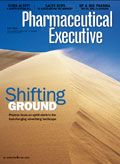In Defense of the Battered Sales Rep
Why pharma sales representatives are still the best marketers and how to make them better.
It's no longer in vogue to be a professional sales rep. In fact, reps have been blamed for everything from the pharmaceutical industry's tainted image to the high price of prescription drugs. Nevertheless, reps continue to be a predominant driver of sales. In fact, try as we might, reps are hard to replace.

Scott Moldenhauer
Perhaps it's time to stand back and ask why. What are the qualities that make reps irreplaceable? What will alternative marketing channels have to provide before the traditional sales rep can be replaced? Moreover, how can the representative role be enhanced to make reps a more powerful sales tool?
Here are a few solutions.
Forced repetition Perhaps the most valuable quality of a great representative is the ability to create "forced repetition." Reps continually remind physicians of the benefits of their products; subsequently, physicians prescribe more of the rep's products.
The reality is that repetition works. As far back as 1957, Harvard psychologist Jerome Bruner talked about the "accessibility rule," meaning that real-world decisions are rarely based on careful thought and deliberation. Moreover, they are often based on top-of-mind factors: If the physician easily retrieves the product name from memory, the product is more likely to be prescribed. In other words, the more often a rep sees a physician, the more likely the physician is to prescribe his or her product. And for every physician who gets tired of hearing about the "same old product," the same physician admits to forgetting about the advantages of a product that has been around for years. It's human nature.
Any selling model devoid of repetition will be of limited utility. Unless human nature changes radically, repetition will continue to be a necessary ingredient for success. So far, reps continue to be best suited for creating the repetitive sales calls needed to create success.
For example, compare the traditional rep visit to online efforts. Online efforts lack the quality of repetition. When a physician logs onto his or her computer and learns about a product once, what's the incentive to come back? PhRMA guidelines prevent monetary incentives. There are only so many "medically relevant" gifts that can be used to entice physicians into another review of a product they already know. There truly is no incentive to come back and relearn the same information over and over. Reps, on the other hand, don't wait for physicians to come to them, they go to physicians. Therein lies their utility.
Ability to connect Anyone who has "carried the bag" knows the incredible power of a firm handshake, a familiar smile, and an intelligent conversation between two human beings. Relationships can be powerful tools, especially in a marketplace flooded with hundreds of very similar compounds. When physicians perceive no significant difference between pharmaceutical products, rep relationships become remarkably influential. After all, if you needed to choose one of two products of indistinguishable quality, and you know, like, and respect one of the sales representatives, which would you choose? When all else is equal, physicians will almost always side with the rep he or she likes.
Ability to challenge Great reps challenge the way physicians think and feel about treatment options. While it may sound strange that a rep with a four-year college degree challenge an MD with a much broader foundation in medicine and science, that's exactly what the best reps do. They do it by asking the right questions, leveraging their clinical training, and using superior communication skills. In the process, physicians sharpen the way they think about treatment options.
The ability to appropriately and directly challenge the way physicians think about treatment options is difficult to duplicate with other marketing approaches. While social media is showing some promise for encouraging physician interaction, reps are ideally suited when it comes to deciphering the thousands of subtle cues that can occur during a sales call. The ability to challenge treatment decisions is a talent unique to reps, and one more reason they are hard to replace.
How to Make Reps More Effective
While reps offer qualities that are hard to replace by other marketing methods, the room for improvement is enormous. With few exceptions, most training departments continue to train 1990's sales strategies. Why? Changes have happened so rapidly that it's hard to keep up. In addition, changes like access restrictions and managed care formulary restrictions seem insurmountable. How can we improve the process? Consider the following.
Access skills According to SK&A, the number of offices that restrict representative access is close to 50 percent. The key word is "restrict." Most offices are neither completely open nor completely closed; they are somewhere in between. Some reps successfully access physicians, many cannot. The good news? We know what makes the difference.
When it comes to improving the ability to access physicians, the results can be immediate and dramatic. Unfortunately, most companies have given up on access. Rather than providing access training, they say, "Go where the doctors will see you." This is a mistake. In fact, it takes very little effort to improve access to physicians. As of this writing, the most popular mode of accessing a busy physician is as follows. The rep enters a busy clinic. The rep greets the receptionists and says, "I'm wondering if you need samples." The receptionist informs the representative that they have plenty of samples. The rep turns and says, "See you next time." Certainly we can do better.
Even when the office is in need of samples—and the rep has the opportunity to interact with the physician—there is typically failure when it comes to transitioning from a sample signature into a product discussion. Reps can be trained to overcome access objections like "The doctors are busy" and "We only see reps at lunch." My personal research shows that the majority of reps fail to ever ask to see the physician. Simply making the request has the potential to improve physician access rates. The point? Reps can access more physicians, and basic access training programs can accelerate the process. The potential for increased reach and frequency is extraordinary.
Messaging skills Over the last several years, there has been a revolution in messaging technology. Social scientists and communications experts have found truth in the cultural adage, "It's not just what you say but how you say it." Books like "Chip" and Dan Heath's "Made to Stick" show us that slight modifications in the way representatives deliver a message can make an enormous difference to results. While communications advances are being used to train sales representatives in other industries, they have been largely ignored by pharma. Perhaps this is a manifestation of pharma's feeling that the sales rep will soon be a thing of the past. Whatever the cause, there now exists a simple technology to go beyond features and benefits selling. Companies that take advantage of this technology can quickly maximize revenue.
Improve morale Reps don't have the same spirit they had 10 years ago. Declining profits, patent expirations, and layoffs are now a part of their daily reality. While reps once looked forward to their future with spirit and enthusiasm, the new realities of an uncertain future bring fear and apathy. The morale of many sales reps has started to erode. Why is this important? Enthusiasm is an important driver of sales and low morale thwarts enthusiasm.
What can you do to boost the morale of your reps? Advertise positive news. A pep talk at the national meeting is no longer enough. Companies need to frequently advertise company victories, new product possibilities, and reasons to have faith in the future. Even the slightest victory has the potential to change attitudes, increase morale, and make your reps more effective salespeople.
Build in office relationship skills Building physician relationships outside of the office is no longer an option. PhRMA guidelines and other restrictions have made one-on-one physician dinners a thing of the past. Unfortunately, it was easier to create relationships over an elegant dinner than the confines of a busy practice. Nevertheless, we need to adapt to the new environment. That means getting better at building relationships during work hours.
A simple technology for building relationships in a fraction of the time now exists. Training programs that stress in-office relationship skills can be used to help your reps become more influential within the context of a busy office practice. Reps who increase their ability to influence key office players more quickly will be more successful.
In summary, reps are here to stay, at least until a new selling model can effectively replace their superior ability to create repetitive messages, leverage relationships, and challenge the treatment decisions of physicians. Nevertheless, there is great room for improvement. Companies can immediately increase representative ROI by providing access training and teaching their reps to take advantage of new messaging technology. In addition, in light of PhRMA guidelines, reps should be trained with new skills that will enable them to more quickly and effectively build relationships with physicians within the confines of a busy medical setting. Last, companies that focus on increasing rep morale can build a better emotional foundation for creating rep enthusiasm and improving sales.
Scott Moldenhauer is president of the Persuasion Consultants, LLC. He can be reached at scott@greatpharmareps.com

The Misinformation Maze: Navigating Public Health in the Digital Age
March 11th 2025Jennifer Butler, chief commercial officer of Pleio, discusses misinformation's threat to public health, where patients are turning for trustworthy health information, the industry's pivot to peer-to-patient strategies to educate patients, and more.
Navigating Distrust: Pharma in the Age of Social Media
February 18th 2025Ian Baer, Founder and CEO of Sooth, discusses how the growing distrust in social media will impact industry marketing strategies and the relationships between pharmaceutical companies and the patients they aim to serve. He also explains dark social, how to combat misinformation, closing the trust gap, and more.